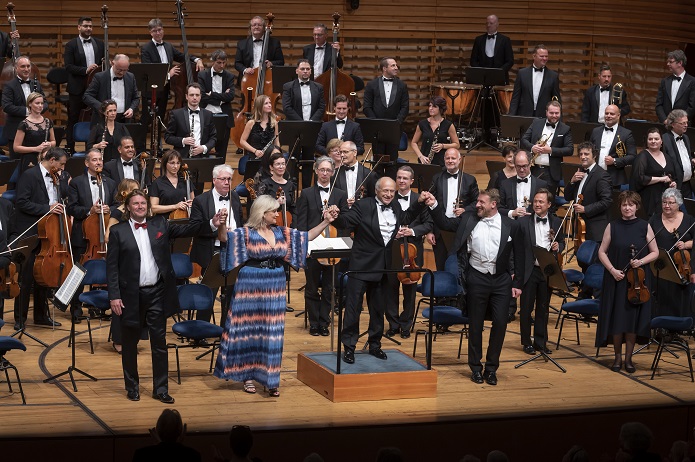
 Switzerland Lucerne Festival [1] – Wagner: Soloists, Budapest Festival Orchestra / Iván Fischer (conductor). Kultur- und Kongresszentrum (KKL) Luzern, Lucerne, 23.8.2022. (JR)
Switzerland Lucerne Festival [1] – Wagner: Soloists, Budapest Festival Orchestra / Iván Fischer (conductor). Kultur- und Kongresszentrum (KKL) Luzern, Lucerne, 23.8.2022. (JR)

Wagner – Siegfried Idyll
Wagner – Die Walküre, Act I (concert performance)
Sieglinde – Camilla Nylund
Siegmund – Klaus Florian Vogt
Hunding – Günther Groissböck
August and September are traditional music festival times in the northern hemisphere and the prestigious Lucerne Festival has just started, normally attracting music lovers from around the globe. For this concert there were, oddly, rather too many empty top price seats – after-effects of the pandemic or rising energy prices forcing a tightening of belts?
The Budapest Festival Orchestra was formed in 1983 by Iván Fischer and Zoltán Kocsis ‘drawn from the cream of Hungary’s younger players’. Now, forty years, later a few of those younger players now visibly remain, now probably close to retirement, supplemented with fresh, younger talent. They make a lovely sound; they are a fine band.
To start this all-Wagner programme, we were served a substantial amuse bouche in the shape of the Siegfried Idyll. Wagner had composed the piece as a birthday present to his second wife, Cosima, after the birth of their son Siegfried in 1869. It was first performed on Christmas morning, 25 December 1870, by a small ensemble of the Tonhalle Orchestra Zürich on the stairs of their villa at Tribschen, which is now within easy walking distance of the Kultur- und Kongresszentrum (not built at that time, obviously): Cosima awoke to its opening melody. Apparently Cosima refused publication of the work for quite a while, arguing that the piece was her birthday gift. On the stairs of the villa, Wagner had to reduce the number of players and probably put the woodwind at the top of the stairs with some strings below. In concert nowadays, the strings are augmented but Fischer cleverly put his woodwind section right at the front of the stage, and had the sole trumpeter stand for his contribution. We were able to revel in the sound of the woodwind, not covered in any way by string sound; I was particularly impressed by principal clarinet Ákos Ács. The playing of the fine concertmaster, Tamás Major, caught the ear and eye. The horns were soft and secure, this was a very gentle, loving performance and the suave Fischer brought the work to a luminous conclusion.
The first act of Die Walküre lends itself easily to concert performance. One does not need a set, or chorus, or special effects. Anyone who has seen any production of the opera will be able to picture the scene, even if attending the current modern and contentious Bayreuth production. Only two moments in the act are aided by props or a set – the ash tree with the sword (Nothung) stuck in it by Wotan and the sudden appearance of the Spring to lighten up the gloom and despair of Hunding’s hut. There were surtitles, but oddly – given the international audience and clear diction of the experienced singers – only in German and not in English.
On to the singers: Fischer was able to assemble a topflight cast which would not disgrace Bayreuth or any international opera house; and with only one Act to sing, and one performance, they had no reason to hold back. They made a perfect vocal and visual love triangle.
Klaus Florian Vogt knows the part of Siegmund inside out and is in peak form. ‘Winterstürme wichen dem Wonnemond’ was beautifully sung. I have heard the cries of ‘Wälse! Wälse!’ more thrillingly sung and held on for longer, but this was perhaps deliberately less theatrical. Camilla Nylund will soon be taking on the role of Brünnhilde in Zurich, but she proved she is also a good Sieglinde: when asked by Siegmund (hitherto known as Wehwalt) what his name should be, her cry of ‘Siegmund’ was shattering. Top prize went perhaps to Günther Groissböck, whose every phrase glistened with chilling menace; his rich, resounding deep bass is a wonderful instrument.
The orchestra make a very fine sound, I was particularly taken by the principal cello, Péter Szabó. Having the full orchestra on stage in such glorious music, rather than hidden in a pit or obscured in Bayreuth, added to the pleasure of seeing and hearing the full wash of orchestral colour. Amongst many fine moments, the cellos attacked their instruments to evoke the wild storm as the scene opens and the harps glistened as Spring burst into and illuminated the hut.
Iván Fischer was clearly no newcomer to the score, prompting his singers with the text (they didn’t need it) and holding the whole work together with complete control. It was a wonderful evening.
John Rhodes
